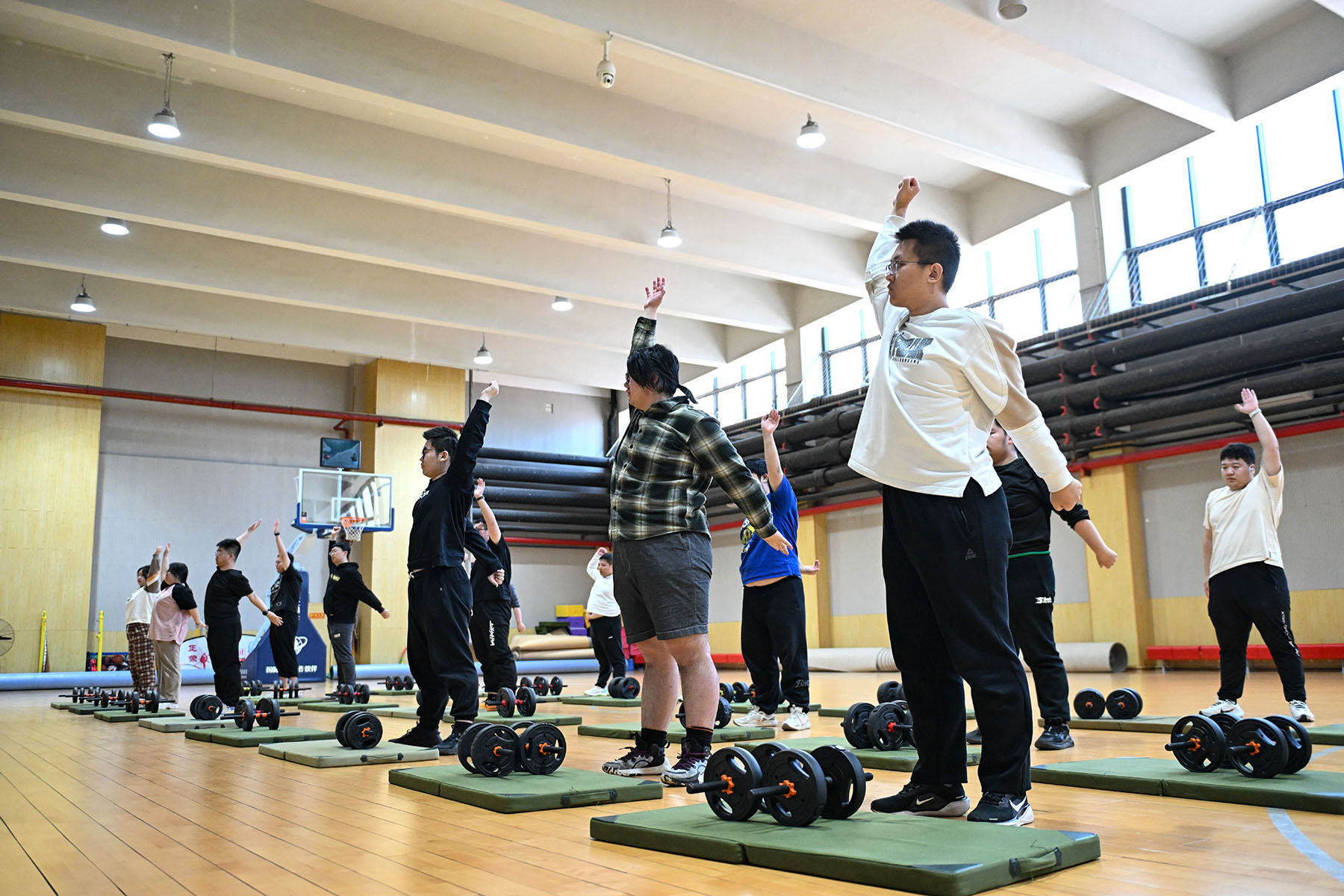Government policies promote improved lifestyles, boost sector

China is seeing the advent of the "slimming economy", with more consumers turning to expert nutritionists, fitness workouts and AI-driven smart devices to stay trim and healthy.
The National Health Commission, the Chinese Center for Disease Control and Prevention and 16 other departments launched a three-year plan in June 2024 to curb the increase in body weight among the Chinese population and encourage the adoption of healthy lifestyles.
In late 2024, the NHC released the guidelines for weight management, which predicted that if the current trends are not effectively controlled, overweight and obesity rates among Chinese adults and children are expected to reach 70.5 percent and 31.8 percent, respectively, by 2030.
Obesity is no longer just a matter of physical appearance — it has become a pressing health concern tied to lifestyle, environment and overlooked medical conditions.
READ MORE: Gym life working out for more women
"The government has encouraged hospitals to open weight management departments. This is to help people look at obesity scientifically, starting from the root causes, rather than just eating less or exercising more," said Fei Jian, deputy director of the Luwan Branch of Shanghai Ruijin Hospital.
Some patients, for instance, eat very little, but gain weight due to factors such as thyroid problems, lack of sleep, stress, and even a gut bacteria imbalance, which can all affect an individual's metabolism.

Fei said the first step in healthy weight management is understanding what drives weight gain. Skipping this crucial step, he warned, often leads to failed attempts at weight loss and maintenance.
"Endocrine disorders can make weight management harder: insulin resistance increases hunger and fat storage, PCOS (polycystic ovary syndrome) promotes visceral fat, growth hormone deficiency reduces muscle and increases fat, and leptin resistance sustains obesity," he said.
Extreme fasting, crash diets, or weight-loss injections may yield quick results, but they can also trigger metabolic crises, electrolyte imbalances, acute pancreatitis, or heart arrhythmia problems.
"Losing more than 1.5 kilograms per week can harm muscles, the heart, and other organs, and very low body fat in women may cause menstrual problems. Safe weight loss is 0.5 to 1 kg per week, supported by gradual, science-based lifestyle changes," said Fei.
He advocates tracking calorie intake, prioritizing sleep to regulate hormones, and setting realistic goals.
"For those with obesity linked to medical conditions such as hypothyroidism or PCOS, personalized care is essential — sometimes involving medication or even surgery — alongside tailored nutrition and exercise guidance," said Fei.
The key to avoiding regaining weight lies in forming good habits, he said. "Long-term balancing of diet, exercise, and rest — supported by a healthy mindset — is what truly safeguards both weight and well-being," he said.

Fit for purpose
Fitness participation is rising, according to the 2024 China Sports and Fitness Industry Data Report.
As of December 2024, China had 87.5 million fitness club members, with active members averaging 5.32 visits per month, and short-term passes accounting for over 60 percent of purchases.
Wu Qingcheng's experience with weight loss offers an insight into the national trend. At 43, the coffee shop owner and fitness coach in Tianjin has experienced the challenge of balancing career demands with his health.
When Wu returned from Japan in 2009, his work in finance brought success, but also excess. Business banquets and irregular schedules pushed his weight from 60 kg to 80 kg. "The hardest part wasn't controlling my diet but maintaining a regular training routine amid an irregular work schedule," said Wu.
Over two years, he shed 10 kg, stabilizing his weight at 70 kg, which he has maintained. As he explored exercise routines and challenged himself, Wu realized fitness was more than building muscle.
"Physical training can bring real improvement to both me and others, and with my own experience, becoming a coach felt like a natural step," said Wu.
His approach reflects a shift from crash diets toward sustainable habits, and he emphasizes three basics: regular exercise, balanced meals, and rest.
"The first step is simply to move. For beginners, even a simple routine can work, but if you find it hard to stay motivated, try group classes — the atmosphere will push you forward," said Wu.
On diet, he advises weighing portions. "It gives you a real sense of what 'a portion' actually means and warns against blindly cutting calories," said Wu.
He prefers home cooking over light meals and cautions against demonizing carbohydrates. Crucially, he makes a distinction between losing weight and losing fat.
"People want quick results, but what's lost too fast often comes back just as fast, while gradual changes — from eating out to home-cooked meals, then tracking calories — help the body and mind adjust," said Wu.
Technology also plays a role. Wu uses a heart rate monitor and smartwatch, believing such tools provide "emotional encouragement" and support consistent results.

Burning money
Nearly 80 percent of young people want to lose weight, with over 50 percent actively trying, according to the 2025 Young People's Weight Loss Report by Just So Soul, the research arm of Chinese social app Soul.
For 60 percent, exercise is the preferred weight-loss method, though 60 percent of those give up within three months. Despite challenges, more than 20 percent have successfully lost around 10 kg, the report said.
Many young people are highly motivated when they start, but later burn out, discouraged by expensive programs, fad diets, and fleeting results.
"I've probably spent more than 50,000 yuan ($7,000) in the past five years just trying to lose weight. Gyms, boot camps, slimming teas, apps, beauty salon treatments — you name it, I've tried it," said Chen Wen, a 28-year-old brand strategist from Shanghai.
Chen started trying to get fit in her early 20s and was convinced she would eventually find the right method. She signed up for a high-end gym in Jing'an district that charged nearly 1,000 yuan a month. For three months, she faithfully attended early morning spin classes and strength training sessions, but the results were patchy.
"The schedule was too intense. After late-night client dinners, there was no way I could keep it up," said Chen.
Next came intermittent fasting, juice cleanses, and calorie-counting apps. She spent 2,000 yuan on a package of imported "detox" juices that promised rapid results. "I ended up hungry, dizzy, and bingeing on hotpot with friends the following weekend," she said with a laugh.
Beauty salons were another costly detour.
Chen tried "fat-burning" treatments with AI body scans that claimed to target "stubborn" areas. Each session costs 800 yuan, and she completed nearly 10, but the changes were barely noticeable.
"It felt more like I was burning my money more than burning fat. Despite all my efforts, the weight always came back, and what I lost most wasn't fat — it was my confidence. Every time I failed, it wasn't just about my body — it felt like I was failing as a person," said Chen.
She came to realize the problem wasn't her willpower, but the unsustainable methods she was using. Now, instead of punishing herself with rigid diets and grueling routines, Chen takes evening walks in a small park near her apartment, cooks balanced meals with fresh produce, and meditates to ease stress.
"While I still hope to slim down, my priorities have changed. I want to feel strong, energetic, and comfortable in my own skin; for me now, that's the real definition of fitness," she said.

Avoid quick fixes
Nutritionist Zou Yu, a 39-year-old in Kunshan, Jiangsu province, has seen firsthand how many people struggle with misinformation and unrealistic expectations.
She has spent 14 years helping over 1,000 clients navigate the challenges of weight management, guiding them toward practical, long-term strategies for healthier living.
"In one-on-one consultations, most clients aim to improve health markers rather than appearance. Obesity often brings endocrine disorders, fatty liver, high blood lipids, and other risks," said Zou.
Her personalized nutrition plans help clients who previously relied on extreme diets, by meeting their individual metabolic needs and providing a variety of foods and balanced nutrition for effective weight loss.
One client, for instance, repeatedly failed in his weight loss efforts, after following extreme and liquid-only diets. Zou created a tailored meal plan for him.
"He followed the plan without feeling deprived. After a month, he lost 5 kg and felt energized," she said.
China's meal replacement market reached 175 billion yuan in 2023 and is expected to grow to 353.49 billion yuan by 2027, with an average annual growth rate of approximately 19.5 percent, according to an iiMedia Research report released in 2023.
Products like meal replacements can help clients achieve results, but Zou warns against long-term reliance on them.
"They may reduce energy intake temporarily, but the weight often returns when normal eating resumes. Sustainable results come from methods suited to an individual's body," she said.
Over the years, Zou has observed a shift in both the consumer mindset and professional practices. "Previously, people relied on pills, extreme diets, or laxatives, which could harm the body. Today, practitioners have medical or nutritional expertise, guiding clients safely. Consumers increasingly trust science-based approaches and seek professional guidance," she said.
Technology also significantly improved Zou's work efficiency, allowing her to analyze clients' daily nutrition and energy intake through photos and apps with AI dietary analysis. Wearable devices provide valuable data on sleep quality, activity levels, and heart rate, offering crucial insights for weight-loss progress.

High-tech help
In 2024, China shipped 61.16 million wearable fitness devices and was also the largest market for such devices, according to a report by global market consultancy IDC.
Supporting this trend, the April 2024 Special Action Plan for Promoting Healthy Consumption encourages technological empowerment and smart, portable fitness and outdoor equipment.
As AI continues to be applied in fitness, companies like Speediance are betting that personalization, consistency, and community will define the next era of health management in China.
Yang Wenhui, head of global market development at Speediance, said: "The biggest value of technology is to improve efficiency, reduce trial-and-error, and enhance the feeling of being accompanied."
Speediance's flagship product, Gym Monster 2, an all-in-one home gym machine, provides intelligent resistance training, while products like VeloNix, a smart indoor cycling bike, and the Wellness+ platform expand the ecosystem into cardio, nutrition, and personalized guidance.
"Wellness+ represents the company's evolution. It's not just a coach, it's more like a health steward that understands your personal rhythm," said Yang.
By integrating AI algorithms with real-time health data, the platform adapts training plans, tracks progress, and connects nutrition with exercise, providing a holistic approach that goes beyond traditional dieting and workouts.
"For example, Wellness+ allows users to snap a photo of their meal, instantly calculating calories and syncing data to adjust training plans. Instead of letting diet and exercise remain disconnected, we bring them together in one loop," said Yang.
ALSO READ: Sporting goods go beyond fun and games
Speediance also emphasizes community building, encouraging users to share experiences and celebrate milestones.
"That kind of peer-to-peer encouragement strengthens motivation, gives users a sense of belonging, and provides the real energy that makes people go further," she said.
Yang envisions the slimming economy expanding into a broader health ecosystem, one that covers not only weight but also strength, endurance, mental well-being, and social connection.
"For Speediance, the goal is to evolve from a hardware provider into a long-term health partner. We don't want people to see us merely as a manufacturer of fitness equipment, but also as a company providing sustainable solutions for holistic health management," said Yang.
Contact the writer at sunnyu923@163.com


